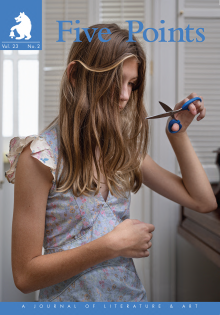Five Points Vol. 23, No. 2
FallSample Content
John Skoyles
Art and Letters
John asks Jen’s help in introducing Sheila to the world of arts and letters. So Jen has invited Nick, an actor, and Bree, his novelist wife. John hopes Sheila will be enchanted. He wants, he hopes. He tries everything to lure her into his life, an effort based on a wish, a wish blown into the atmosphere like a dandelion whose seeds are this cast of characters.
Jen and Frank are in their sixties. Jen writes articles for travel magazines based on research. She never leaves her apartment. When she was a sophomore at Sarah Lawrence, she published two poems in The Atlantic. Because the faculty stood in awe of her, her work died of over encouragement. When she failed to publish anything more by graduation, she stopped writing. Her competitive classmates referred to her as “the late poet, Jennifer Tottle.”
Frank is preparing for a show with a major gallery. John has used his images of a squid, a weir and skeletal ships on the covers of his books. Frank was dropped by his former dealer after two powerful reviewers, in simultaneous critiques, called his paintings “tentative.” These critical dismissals and lack of sales sent Frank into an immobilizing depression that lasted a year, out of which he emerged in full agreement with his critics. He decided his work was tentative, and he entered his studio with a burst of energy so imaginative that it alarmed Jen. When she saw the skinned faces of dead cats sewn to denim nailed on his studio walls, and mice bones stacked into catacomb-like labyrinths, she convinced him to sign into Creedmoor Psychiatric, citing Lou Reed’s successful recovery there. While institutionalized, Frank discovered Karl Shapiro’s poetry and learned that when Shapiro’s work was criticized as too “Jewish,” he named his next book, Poems of a Jew. And when demeaned for “bourgeois” subject matter, called his new collection, The Bourgeois Poet. Frank took courage from Shapiro’s steadfastness and returned to his former cautious ways supported by his therapist’s advice that when he’s criticized for something, he should emphasize it, because it is really him. So now Frank has taken the bold step of being tentative.
Jen and Frank live on Riverside Drive in a columned, pre-war building. Sheila stares into the lobby at the uniformed doorman standing at a podium as if about to give a press conference. But John takes her past the main entrance to the side street. They walk through an alley and down a flight of stairs. They duck under a beam and enter a maze of recycling bins, hand-trucks, pails, shovels, brooms and mops. Beyond a wall of gas and electric meters, they arrive at the apartment. Dark and illegal, it was converted from an ancient fallout shelter by the super to make extra cash. There is no nameplate, buzzer or knocker and John pushes at the slightly open door and calls hello. Frank appears looking aggravated and they hear Jen yelling, “You don’t know who I am!”
John hands him a bottle of wine and they enter the kitchen, an alcove where Jen hovers over two hot plates. Jen is a stout, freckled woman with a double chin that disappears when she smiles, and she is grinning now to make light of the spat she knows they’ve overheard.
“I was telling Frank I grew up with a Viking range and a Jenn Air, and look at this mess.” She points to the hot plates on which pots have boiled over, dripping their contents down the side of a brand new kitchen block. Smoothing her hands on the front of her apron, she says with a hearty smile, “This is not who I am!” and shakes her head negatively.
Nick gets up from a folding chair. “I haven’t seen you since Christ left Chicago,” he says to John. “Not since you stopped drinking.” He’s dressed in black, with a few days growth of beard, hair mussed and moussed perfectly. His belt is six notches too long and hangs about his fly like a long tongue or soft scabbard. Nick and John went to high school together in Astoria. Nick was such a skinny and pale boy, he was nicknamed “Lint.” He’s married to Bree, a thin red head in jeans, red high-top Converse sneakers and a white t-shirt with holes at the collarbone. She’s vaping and holds a glass of pink liquid. Always curious about cocktails, especially one this shade, John asks what she’s drinking. She says, “Straight vodka.” She has only one reason for noting the modifier: to continue her image. John feels stupid when he realizes the glass itself is pink, not the contents. And he’s put off by her reply because you can’t impress an alcoholic with an adjective. . . .

